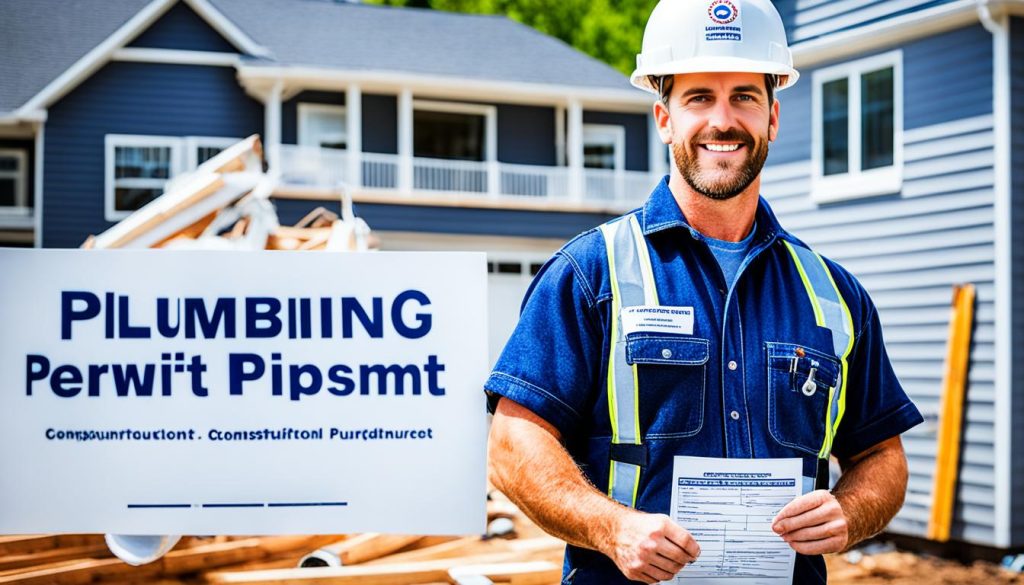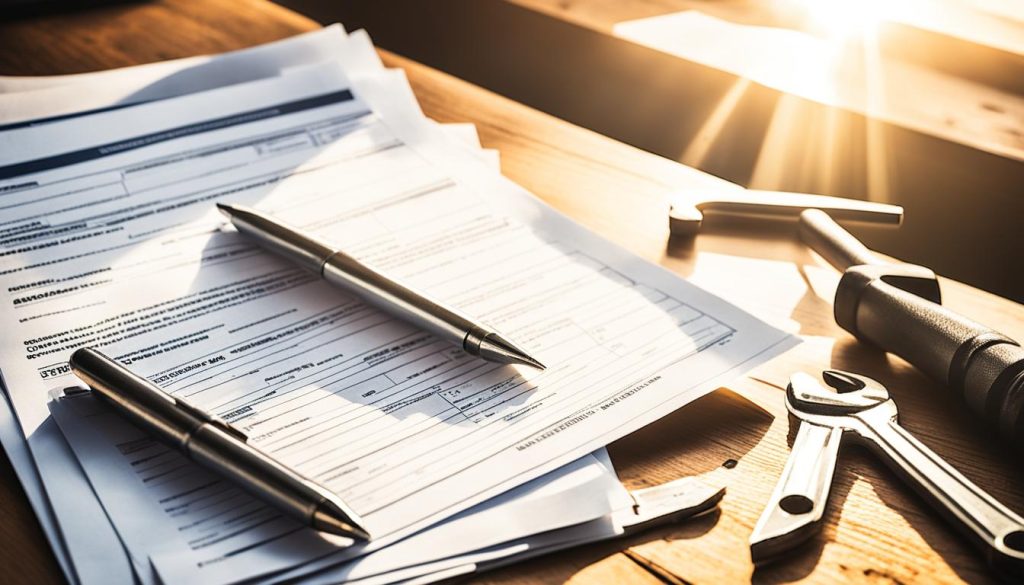Who Can Pull a Plumbing Permit? Quick Guide
Did you know that nearly all plumbing work requires a permit? Yes, whether you’re building or repairing a plumbing system, a permit is generally required. But don’t worry, I’m here to guide you through the process and help you understand who can pull a plumbing permit and what the requirements are.
Key Takeaways:
- To construct, change, renew, or repair a plumbing system, a plumbing permit is typically required.
- There are certain situations where a permit may not be needed, but it’s important to know your local plumbing regulations and rules.
- In most cases, a licensed plumbing contractor is responsible for obtaining the permit, but homeowners may be able to pull the permit in certain circumstances.
- The process for applying for a plumbing permit involves submitting an application, providing necessary documentation, and paying the required fees.
- After obtaining the permit and completing the plumbing work, inspections must be scheduled to ensure compliance with regulations.
When is a Plumbing Permit Required?
In accordance with local plumbing regulations and municipality plumbing rules, it is important to understand when a plumbing permit is required. Whether you’re planning a major remodel or a small project, obtaining the necessary permit is crucial to ensure compliance and maintain the safety and quality of your plumbing work.
A plumbing permit is typically required for significant plumbing work, which includes:
- Installation of new plumbing systems
- Changes or upgrades to existing plumbing systems
These requirements apply to both residential and commercial properties. It is essential to check your local building codes and laws to determine the specific plumbing permit requirements for your area. Failure to obtain a required permit can result in penalties and potential issues with the functionality and safety of your plumbing system.
To provide a clearer understanding of when a plumbing permit is necessary, here are some examples of projects that typically require a permit:
- Installing a new bathroom or kitchen
- Adding or moving plumbing fixtures
- Installing a new water heater or replacing an existing one
- Modifying or extending water supply or drainage lines
- Undertaking significant repairs to plumbing infrastructure
Keep in mind that these examples are not exhaustive, and the specific requirements may vary based on your location. It is essential to consult your local building department or municipal office for accurate information regarding plumbing permit requirements.
Ensuring compliance with plumbing permit requirements helps maintain the integrity of the plumbing system, minimizes the risk of issues, and ensures that the work is carried out by qualified professionals or individuals with a thorough understanding of plumbing regulations.
Next, we’ll explore who is responsible for pulling a plumbing permit and how the process works. But first, take a moment to check out this insightful image:
In the image above, you can find essential information regarding plumbing permit requirements that will help you better understand the next sections.
Who Can Pull a Plumbing Permit?
In most cases, a licensed plumbing contractor is responsible for applying and obtaining a plumbing permit. They have the knowledge and expertise to ensure that the plumbing work meets the necessary regulations and standards. However, there are certain situations where homeowners may be able to pull a plumbing permit themselves. This typically applies to detached single-family homes where the homeowner owns and resides in the property, and the work will be done by the homeowner themselves. It’s important to note that the specific requirements may vary depending on the municipality, so it’s crucial to verify the regulations in your area.
When Can Homeowners Apply for a DIY Plumbing Permit?
While professional assistance is often recommended for plumbing permits, homeowners may be able to apply for a DIY plumbing permit in certain cases. Here are some situations where homeowners may be eligible:
- Detached single-family homes: Homeowners who own and reside in a detached single-family home may be able to apply for a DIY plumbing permit.
- Work done by the homeowner: The work must be done by the homeowner themselves and not contracted out to a third party.
- Minor plumbing projects: DIY permits typically apply to minor plumbing projects that do not involve major renovations or complex plumbing systems.
It’s important to consult your local municipality and verify the specific requirements for DIY plumbing permits in your area. Some municipalities may have additional criteria or limitations.
How to Apply for a Plumbing Permit
When it comes to applying for a plumbing permit, it’s essential to follow the process set by your municipality. This ensures that you meet all the necessary requirements and comply with the local plumbing regulations. Here’s a step-by-step guide on how to apply for a plumbing permit:
Gather the Required Documentation
Start by gathering all the necessary documentation for your plumbing permit application. This typically includes plans and specifications of the plumbing work you intend to undertake. Make sure your plans are detailed and accurate, as this will help the municipality assess your project better. Additionally, be prepared to provide any other supporting documents that the municipality may require.
Submit the Permit Application
Once you have your documentation in order, it’s time to submit your plumbing permit application. You can usually do this in person at the municipality office or through their online permitting system, if available. Follow the instructions provided by the municipality and make sure to fill out the application form accurately and completely. Any missing or incorrect information could delay the processing of your permit.
Pay the Required Fees
Along with the permit application, there are usually fees associated with obtaining a plumbing permit. These fees help cover the costs of processing your application and conducting inspections. The amount of the fees will depend on the scope and complexity of your plumbing project. Be sure to inquire about the fee structure and payment methods accepted by your municipality.
Once you have submitted your application and paid the fees, the municipality will review your documentation and assess whether your plumbing work complies with the local plumbing rules and regulations. This process may take some time, so be patient and awaiting updates from the municipality regarding the status of your permit application.
Applying for a plumbing permit can be a crucial step in ensuring the safety and legality of your plumbing project. By following the process set by your municipality, you can obtain the necessary permit and proceed with your plumbing work with confidence.
| Step | Action |
|---|---|
| 1 | Gather the required documentation, including detailed plans and specifications. |
| 2 | Submit the permit application accurately and completely. |
| 3 | Pay the required fees associated with the plumbing permit. |
| 4 | Await the municipality’s review and assessment of your application. |
Book and Schedule Plumbing Inspections
Once you have obtained a plumbing permit and completed the plumbing work, it is essential to schedule inspections to ensure compliance with the municipality’s plumbing rules and regulations. These inspections are crucial to confirm the safety and quality of the plumbing installation. The number of inspections required may vary depending on the complexity of the project.
Typically, two types of inspections are conducted: rough-in inspections and final inspections. Rough-in inspections are performed during the plumbing installation to ensure that the pipes, drains, and other fixtures are correctly placed and meet the required standards. On the other hand, final inspections are carried out once the plumbing work is completed to verify the overall functionality and compliance of the system.
To book plumbing permit inspections, you need to contact your local designated inspection department. They will provide you with the necessary information and guide you through the process. It is crucial to schedule the inspections in a timely manner to avoid any delays or complications.
During the inspections, it is advisable to have a licensed plumbing contractor present on-site. Their expertise and knowledge can help address any concerns or deficiencies that may arise during the inspection process. This ensures that any issues are resolved promptly and that your plumbing work meets the necessary standards.
Professional Assistance for Plumbing Permits
If you’re feeling unsure or overwhelmed by the plumbing permit process, seeking professional assistance can be a valuable resource. Licensed plumbing contractors and plumbing permit expeditors have the expertise and knowledge to help guide you through the permit application process, ensuring compliance with regulations and handling any necessary inspections.
By enlisting the help of professionals, you can save time and have peace of mind knowing that your plumbing work meets the necessary standards. These experts understand the intricacies of local plumbing regulations and can navigate the process efficiently, ensuring that your project stays on track.
Whether you’re facing a complex remodel or a smaller plumbing project, professional plumbing permit assistance can be a game-changer. They will work closely with you to gather all the required documentation and submit the permit application accurately and in a timely manner. Additionally, they can schedule and coordinate inspections, ensuring that a licensed plumbing contractor is present during the inspections.
Source Links
- https://vancouver.ca/home-property-development/plumbing-and-gas-permits.aspx
- https://www.saskatoon.ca/business-development/building-development-construction/plumbing
- https://www.thespruce.com/when-is-a-plumbing-permit-required-2718700
- Investing Wisely: How Windows & Doors in Boost Property Value and Financial Health - April 24, 2025
- The Financial Impact of Personal Injuries: Why Legal Help Matters for Business Owners - April 16, 2025
- The Hidden Financial Costs of Domestic Assault: What Business Owners Need to Know - April 16, 2025













